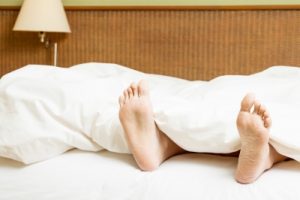Lack Of Sleep Can Trigger Overeating
 Among the many factors that may trigger the tendency to overeat, a lack of sleep may be one of them, according to new research.
Among the many factors that may trigger the tendency to overeat, a lack of sleep may be one of them, according to new research.
Scientists from the University of Nebraska explored the relationship between food and sleep, reporting that a multitude of factors that arise from not enough shut eye can combine to cause overeating.
“Understanding the mechanisms linking disrupted sleep patterns to increased food intake is important for informing both prevention and treatment interventions for chronic health conditions,” the study authors wrote in the Journal of Health Psychology.
Compensating for lost energy
According to the study, adults with disrupted sleep patterns are more likely to overeat to compensate for energy lost due to insufficient sleep. In fact, men and women who are sleep deprived may increase their daily energy intake by 20 percent – even though they report no greater desire to eat than their peers who aren’t sleep deprived.
Other findings from the study suggest that people are more likely to increase their portion sizes after not enough sleep, regardless of what foods they eat. High-carbohydrate snacks, too, are more sought after by individuals who haven’t slept well.
Having a more irregular eating schedule after losing sleep was common, too, researchers reported. This can lead to overeating and a disruption in hunger hormones – hormones that normally regulate appetite when a person has a consistent sleep-wake cycle.
“Health psychologists should be mindful of the link between sleep and eating, and sleep should be actively considered in efforts to modify dietary behavior,” the team concluded.
Source: Journal of Health Psychology
Image courtesy of FrameAngel/FreeDigitalPhotos.net
 Eating Disorder Self Test. Take the EAT-26 self test to see if you might have eating disorder symptoms that might require professional evaluation. All answers are confidential.
Eating Disorder Self Test. Take the EAT-26 self test to see if you might have eating disorder symptoms that might require professional evaluation. All answers are confidential.